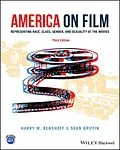A comprehensive and insightful examination of the representation of diverse viewpoints and perspectives in American cinema throughout the 20th and 21st centuries
America on Film: Representing Race, Class, Gender and Sexuality at the Movies, now in its third edition, is an authoritative and lively examination of diversity issues within American cinema. Celebrated authors and academics Harry M. Benshoff and Sean Griffin provide readers with a comprehensive discussion and overview of the industrial, socio-cultural, and aesthetic factors that contribute to cinematic representations of race, class, gender, sexuality, and ability.
The book incorporates several different theoretical perspectives, including film genre, auteurism, cultural studies, Orientalism, the "male gaze," feminism, and queer theory. The authors examine each selected subject via representative films, figures, and movements. Each chapter also includes an in-depth analysis of a single film to illuminate and inform its discussion of the chosen topic.
America on Film fearlessly approaches and tackles several controversial areas of representation in film, including the portrayal of both masculinity and femininity in film and African- and Asian-Americans in film. It devotes the entirety of Part V to an analysis of the depiction of sex and sexuality in American film, with a particular emphasis on the portrayal of homosexuality. Topics covered include:
* The structure and history of American filmmaking, including a discussion of the evolution of the business of Hollywood cinema
* African Americans and American film, with a discussion of BlacKkKlansman informing its examination of broader issues
* Asian, Latin/x, and Native Americans on film
* Classical Hollywood cinema and class, with an in-depth examination of The Florida Project
* Women in classical Hollywood filmmaking, including a discussion of the 1955 film, All that Heaven Allows
Perfect for undergraduate and graduate students in film, media, and diversity-related courses, the book also belongs on the shelves of anyone interested in diversity issues in the context of American studies, communications, history, or gender studies. Lastly, it's ideal for use within corporate diversity training curricula and human relations training within the entertainment industry.
Autorentext
HARRY M. BENSHOFF, PhD, is Professor of Media Arts at the University of North Texas. He received his PhD in Critical Studies at the University of Southern California's School of Cinema-Television. His research focuses include the representation of African Americans and queer people in film and television, particularly within the horror genre.
SEAN GRIFFIN, PhD, is Professor of Film and Media Arts, Southern Methodist University. He received his doctorate from the University of Southern California in 1997. He has written and studied extensively in the area of queer representation in film, as well as the history of the American musical film.
Inhalt
Preface to the Third Edition xi
Acknowledgments xiv
How to Use This Book xvi
About the Companion Website xviii
Part I Culture and American Film 1
1 Introduction to the Study of Film Form and Representation 3
Film Form 3
American Ideologies: Discrimination and Resistance 6
Culture and Cultural Studies 12
Case Study: Two Lion Kings (1994 and 2019) 17
Questions for Discussion 21
Further Reading 21
2 The Structure and History of Hollywood Filmmaking 22
Hollywood vs. Independent Film 22
The Style of Hollywood Cinema 24
The Business of Hollywood 29
The History of Hollywood: The Movies Begin 31
The Classical Hollywood Cinema 35
World War II and Postwar Film 37
New Hollywood and the Blockbuster Mentality 40
Box: A Brief History of Television in the United States 42
21stCentury Convergence Culture 44
Questions for Discussion 47
Further Reading 47
Further Screening 48
Part II Race and Ethnicity and American Film 49
Introduction to Part II: What is Race?
3 The Concept of Whiteness and American Film 55
Seeing White 56
Bleaching the Green: The Irish in American Cinema 60
Looking for Respect: Italians in American Cinema 64
A Special Case: Jews and Hollywood 69
Case Study: The Jazz Singer (1927) 74
Veiled and Reviled: Arabs on Film in America 74
Conclusion: Whiteness and American Film Today 80
Questions for Discussion 81
Further Reading 81
Further Screening 82
4 African Americans and American Film 83
African Americans in Early Film 83
Blacks in Classical Hollywood Cinema 87
World War II and the Postwar Social Problem Film 89
The Rise and Fall of Blaxploitation Filmmaking 92
Box: Blacks on TV 94
Hollywood in the 1980s and the Arrival of Spike Lee 96
Black Independent vs. NeoBlaxploitation Filmmaking in the 1990s 98
African Americans and the Oscars 100
Case Study: BlacKkKlansman (2018) 103
The Twentyfirst Century: Smaller Films, Bigger Profits? 106
Conclusion 108
Questions for Discussion 109
Further Reading 109
Further Screening 110
5 Native Americans and American Film 111
The American Indian Before Film 112
Ethnographic Films and the Rise of the Hollywood Western 114
The Evolving Western 118
A Kinder, Gentler America? 121
Case Study: Smoke Signals (1998) 124
Conclusion: Twentyfirst Century Indians? 125
Questions for Discussion 129
Further Reading 129
Further Screening 129
6 Asian Americans and American Film 130
Silent Film and Asian Images 131
Asians in Classical Hollywood Cinema 133
World War II and After: War Films, Miscegenation
Melodramas, Kung Fu, and the Start of Asian American
Independent Filmmaking 136
Towards a Global Hollywood: Asian American Actors
and Filmmakers of the Last Thirty Years 141
Case Study: Crazy Rich Asians (2018) 146
Conclusion 148
Questions for Discussion 148
Further Reading 148
Further Screening 149
7 Latinos and American Film 150
The Greaser and the Latin Lover: Alternating Stereotypes 152
World War II and After: The Good Neighbor Policy 155
The 1950s to the 1970s: Back to Business as Usual? 159
Expanding Opportunities in the 1980s and 1990s 161
Case Study: My Family/Mi Familia (1995) 164
Latino Film in the 21st Century 166
Conclusion: Which Way F...
